Home | Category: Literature
BEGINNING OF THE GILGAMESH STORY
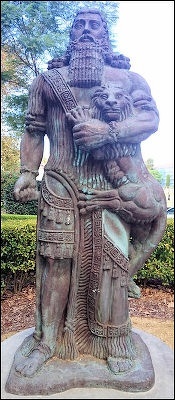
Gilgamesh statue at Sydney University
Joan Acocella wrote in The New Yorker: “We meet Gilgamesh in the first line. He is the King of Uruk, a splendid, high-walled city in southern Mesopotamia. His mother was a goddess and his father a mortal. Accordingly, he is a fine specimen of a man, eleven cubits (seventeen feet) tall and four cubits from nipple to nipple. He is not an exemplary ruler, however. He wearies the young men of his city in athletic contests, and when they marry he insists on the droit du seigneur: he, not the groom, spends the wedding night with the bride. [Source: Joan Acocella, The New Yorker, October 7, 2019]
“The people of Uruk complain to the gods about Gilgamesh’s behavior, and in response the mother goddess, Aruru, pinches off a piece of clay and, from it, fashions a new person, Enkidu, to be a friend to Gilgamesh and distract him from his bad habits. Enkidu is a giant, too, though not as big as Gilgamesh. In the beginning, he is much like an animal. His body is covered with hair. He runs with the gazelles and drinks with them, on all fours, at the water hole. But he has human intelligence; he regularly releases his animal companions from traps. When one of the local trappers objects that Enkidu is interfering with his livelihood, he is instructed to bring a temple prostitute, Shamhat, to the water hole that Enkidu frequents and have her sit at the edge. (There were such beings as temple prostitutes, devotees of local fertility goddesses, in many ancient societies. This was a respected profession.) Enkidu arrives. Shamhat spreads her legs, and he instantly succumbs. With what must be the most robust erection in literature, he engages Shamhat in an uninterrupted act of coitus for six days and seven nights. Then he gets tired, and Shamhat takes him to a shepherds’ encampment. For the first time in his life, he eats bread. He also drinks seven goblets of beer, and he starts to sing. But when he tries to rejoin the gazelles, they shun him. Tragedy thus enters “Gilgamesh.” Through making love with a human being and eating human food, Enkidu has become a man, and nothing will ever be the same for him.
“For example, he now has morals. When he hears about Gilgamesh’s exercise of the droit du seigneur, he becomes enraged. He goes to Uruk and draws Gilgamesh into a fight. The door jambs shake, the walls quake, but after a while the two men weary of the quarrel and decide to be friends. Gilgamesh introduces Enkidu to his mother, the goddess Ninsun. She doesn’t like him. Who are his people? she asks. Thus snubbed, Enkidu weeps, and Gilgamesh, to cheer him up, proposes an adventure: the two of them will go to the Forest of Cedar, kill its protector, the monster Humbaba, and harvest some cedar wood for building projects in Uruk.
See Separate Article: GILGAMESH: HISTORY, DISCOVERY, HIGHLIGHTS AND TRANSLATIONS africame.factsanddetails.com ; GILGAMESH STORY: FROM THE NETHER WORLD TO THE END africame.factsanddetails.com
Websites on Mesopotamia: Internet Ancient History Sourcebook: Mesopotamia sourcebooks.fordham.edu ; International Association for Assyriology iaassyriology.com ; Institute for the Study of Ancient Cultures, University of Chicago isac.uchicago.edu ; University of Chicago Near Eastern Languages and Civilizations nelc.uchicago.edu ; University of Pennsylvania Near Eastern Languages & Civilizations (NELC) nelc.sas.upenn.edu; Penn Museum Near East Section penn.museum; Ancient History Encyclopedia ancient.eu.com/Mesopotamia ; British Museum britishmuseum.org ; Louvre louvre.fr/en/explore ; Metropolitan Museum of Art metmuseum.org/toah ; Ancient Near Eastern Art Metropolitan Museum of Art metmuseum.org; Iraq Museum theiraqmuseum ABZU etana.org/abzubib; Archaeology Websites Archaeology News Report archaeologynewsreport.blogspot.com ; Anthropology.net anthropology.net : archaeologica.org archaeologica.org ; Archaeology in Europe archeurope.com ; Archaeology magazine archaeology.org ; HeritageDaily heritagedaily.com; Live Science livescience.com/
RECOMMENDED BOOKS:
“Gilgamesh: A New English Version” by David Mitchell (Free 2004), an excellent translation. Amazon.com;
“The Epic of Gilgamesh: A Norton Critical Edition” by Benjamin R. Foster (2019) Amazon.com;
“The Epic of Gilgamesh” (Penguin Classics) by Andrew George (2003) Amazon.com;
“Gilgamesh the King” (The Gilgamesh Trilogy) Book 1 of 3: The Gilgamesh Trilogy by Ludmila Zeman, Illustrated, for Kids, (1998) Amazon.com;
“Epic of Gilgamesh, illustrated for adults, Valentin Rey (2024) Amazon.com;
“Gilgamesh: The Life of a Poem” by Michael Schmidt (2019) Amazon.com;
“The Buried Book: The Loss and Rediscovery of the Great Epic of Gilgamesh” by David Damrosch (2007) Amazon.com;
“Myths from Mesopotamia: Creation, the Flood, Gilgamesh, and Others” by 1989) Amazon.com;
“Before the Muses”, An Anthology of Akkadian Literature, by Benjamin R Foster (2005) Amazon.com;
“The Library of Ancient Wisdom: Mesopotamia and the Making of History” by Laura Selena Wisnom (2025) Amazon.com;
“From Distant Days: Myths, Tales, and Poetry of Ancient Mesopotamia” by Benjamin R Foster (1995) Amazon.com;
“The Ancient Near East” (Volume I) by James B. Pritchard (1965) Amazon.com;
“The Ancient Near East” (Volume II), A New Anthology of Texts and Pictures,
by James B. Pritchard (1976) Amazon.com;
Website:The Electronic Text Corpus of Sumerian Literature etcsl.orinst.ox
Prologue of Babylonian Gilgamesh: He Who Saw Everything
In the Prologue of Babylonian Gilgamesh Gilgamesh is described as being two-thirds god and one-third man, and 'like a wild ox.' As the story begins, the nobles of Uruk are complaining to the gods that the mighty Gilgamesh in his restlessness and arrogance is playing havoc with the city.
“He who saw everything in the broad-boned earth, and knew what was to be known
Who had experienced what there was, and had become familiar with all things
He, to whom wisdom clung like cloak, and who dwelt together with Existence in Harmony
He knew the secret of things and laid them bare. And told of those times before the Flood
In his city, Uruk, he made the walls, which formed a rampart stretching on
And the temple called Eanna, which was the house of An, the Sky God
And also of Inanna, Goddess of Love and Battle
Look at it even now: where cornice runs on outer wall shining brilliant copper -see,
There is no inner wall; it has no equal. Touch the threshold - ancient. Approach the palace called Eanna.
There lives Inanna, Goddess of Love and Battle. No king since has accomplished such deeds.
Climb that wall, go in Uruk, walk there, I say, walk there.
See the foundation terrace, touch then the masonry - Is not this of burnt brick, And good? I say;
The seven sages laid its foundation. One third is city; One third is orchards; One third is clay pits- Unbuilt-on land of the Inanna Temple search these three parts, find the copper table-box
[Source: Robert Temple translation, verse version of the Epic of Gilgamesh by Robert Temple, Rider, an imprint of Random Century Group Ltda, 1991, Gates of Babylon]
“Open it. Open its secret fastening. Take out the lapis-lazuli tablet. Read aloud from it.
Read how Gilgamesh fared many hardships
Surpassing all kings, great in respect, a lord in his form
He is the hero, He is of Uruk, He, the butting bull
He leads the Way, He, the Foremost, He also marches at the rear, a helper to his brothers
He is the Great Net, protector of his men. He is the furious flood-wave,
Who destroys even stone walls. The offspring of Lugulbanda, Gilgamesh is perfect in strength
The son of the revered Cow, of the woman Rimat-Ninsun. Gilgamesh inspires perfect awe. He opened the mountain passes, he dug the well on the mountain's flank.
He crossed to the far shore, traversed the vast sea to the rising Sun. He explored the rim, sought life without death. By his strength he reached Ziusudra the Faraway
He who restored living things to their places
Those which the Flood had destroyed
Amidst the teeming peoples,
Who is there to compare with him in kingship?
Who like Gilgamesh can say:
'I am king indeed?'
“His name was called Gilgamesh
From the very day of his birth,
He was two-thirds god, one third man,
The Great Goddess Aruru designed him, planned his body, prepared his form
A perfect body the gods gave
For the creation of Gilgamesh
Shamash the Sun gave beauty
Adad the Storm gave courage
And so he surpassed all others.
He was two-thirds god, one third man,
The form of his body no one can match
Eleven cubits high he is, nine spans his chest
As he turns to see the lands all around him.
But he comes to the city of Uruk.
Long was his journey, weary, worn down by his labours
He inscribed upon a stone when he returned
This story.
Sumerian Prologue to Gilgamesh; The Huluppu Tree
The Huluppu-Tree — a translation of a Gilgamesh Prologue — goes:
After heaven and earth had been separated
and mankind had been created,
after Anûum, Enlil and Ereskigal had taken posesssion
of heaven, earth and the underworld;
after Enki had set sail for the underworld
and the sea ebbed and flowed in honor of its lord;
on this day, a huluppu tree
which had been planted on the banks of the Euphrates
and nourished by its waters
was uprooted by the south wind
and carried away by the Euphrates.
A goddess who was wandering among the banks
seized the swaying tree
And — at the behest of Anu and Enlil —
brought it to Ishtar's garden in Uruk.
Ishtar tended the tree carefully and lovingly
she hoped to have a throne and a bed
made for herself from its wood.
After ten years, the tree had matured.
But in the meantime, she found to her dismay
that her hopes could not be fulfilled.
because during that time
a dragon had built its nest at the foot of the tree
the Zu-bird was raising its young in the crown,
and the demon Lilith had built her house in the middle.
But Gilgamesh, who had heard of Ishtar's plight,
came to her rescue.
He took his heavy shield
killed the dragon with his heavy bronze axe,
which weighed seven talents and seven minas.
Then the Zu-bird flew into the mountains
with its young,
while Lilith, petrified with fear,
tore down her house and fled into the wilderness
[Source: translation is from Kramer38:1f According to the University of Pennsylvania: “This passage, as understood and translated by Samuel Kramer, would include the oldest known reference to Lilith... Kramer's translation with Diane Wolkstein is far smoother (but for style, not accuracy). [Source: UPenn]
Gilgamesh and Agga of Kish
Gilgamesh ignores the elders and goes to war against Agga of Kish: Gilgamesh looses: “1-14: Envoys of Aga, the son of En-me-barage-si, came from Kic to Gilgamesh in Unug. Gilgamesh presented the issue before the elders of his city, carefully choosing his words: "There are wells to be finished, many wells of the Land yet to be finished; there are shallow wells of the Land yet to be finished, there are wells to deepen and hoisting gear to be completed. We should not submit to the house of Kic! Should we not smite it with weapons?" In the convened assembly, his city's elders answered Gilgamesh: "There are indeed wells to be finished, many wells of the Land yet to be finished; there are shallow wells of the Land yet to be finished, there are wells to deepen and hoisting gear to be completed. So we should submit to the house of Kic. We should not smite it with weapons!" [Source: J.A. Black, G. Cunningham, E. Robson, and G. Zlyomi 1998, 1999, 2000, Electronic Text Corpus of Sumerian Literature, Oxford University, piney.com]
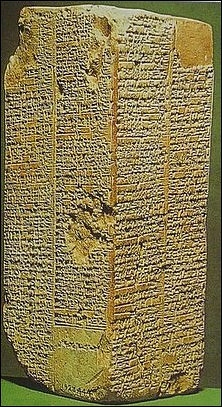
Summerian King List listing both Gilgamesh and Agga of Kish
15-29: “Gilgamesh, the lord of Kulaba, placing his trust in Ishtar, did not take seriously the advice of his city's elders. Gilgamesh presented the issue again, this time before the able-bodied men of his city, carefully choosing his words: "There are wells to be finished, many wells of the Land yet to be finished; there are shallow wells of the Land yet to be finished, there are wells to deepen and hoisting gear to be completed. Never before have you submitted to the house of Kic. Should you not smite it with weapons?" In the convened assembly, his city's able-bodied men answered Gilgamesh: ""Standing on duty and sitting in attendance, escorting the king's son, and forever grasping the donkey's reins — who has that much breath?", as the saying goes. You old men should not submit to the house of Kic! Should we young men not smite it with weapons?
30-47: "The great gods created the structure of Unug, the handiwork of the gods, and of E-ana, the house lowered down from heaven. You watch over the great rampart, the rampart which An founded, the majestic residence which An established. You are its king and warrior, an exuberant person, a prince beloved of An. When Aga comes, what terror he will experience! That army is small, and scattered at the rear. Its men will be incapable of confronting us." Then Gilgamesh, the lord of Kulaba, rejoiced at the advice of his city's able-bodied men and his spirit brightened. He addressed his servant Enkidu: "On this account let the weaponry and arms of battle be made ready. Let the battle mace return to your side. May they create a great terror and radiance. When he comes, my great fearsomeness will overwhelm him. His reasoning will become confused and his judgment disarrayed."
48-69: “Not five, not ten days had passed when Aga, the son of En-me-barage-si, laid siege to Unug with his men. Unug's reasoning became confused. Gilgamesh, the lord of Kulaba, addressed its warriors: "My warriors shall have the choice. Let someone with courage volunteer "I shall go to Aga"." Birhur-tura, his royal guard, spoke in admiration to his king: "I shall go to Aga so that his reasoning will become confused and his judgment disarrayed." Birhur-tura went out through the city gate. As soon as Birhur-tura went out through the city gate, they captured him at the gate's entrance, and then beat Birhur-tura's entire length. He came into the presence of Aga and then spoke to Aga. Before he had finished speaking, an officer of Unug climbed up on the rampart and leaned out over the rampart. Aga saw him and then spoke to Birhur-tura: "Slave, is that man your king?"
70-89: "That man is not my king! Were that man my king, were that his angry brow, were those his bison eyes, were that his lapis lazuli beard, were those his elegant fingers, would he not cast down multitudes, would he not raise up multitudes, would multitudes not be smeared with dust, would not all the nations be overwhelmed, would not the land's canal-mouths be filled with silt, would not the barges' prows be broken, and would he not take Aga, the king of Kic, captive in the midst of his army?" They hit him, they struck him. They beat Birhur-tura's entire length. Gilgamesh climbed up on the rampart after the officer of Unug. His radiance overwhelmed Kulaba's young and old. He armed Unug's able-bodied men with battle maces and stationed them on the causeway at the city gate's door. Only Enkidu went out through the city gate. Gilgamesh leaned out over the rampart. Looking up, Aga saw him: "Slave, is that man your king?"
92-115 "That man is indeed my king." It was just as he had said: Gilgamesh cast down multitudes, he raised up multitudes, multitudes were smeared with dust, all the nations were overwhelmed, the land's canal-mouths were filled with silt, the barges' prows were broken, and he took Aga, the king of Kic, captive in the midst of his army. Gilgamesh, the lord of Kulaba, spoke to Aga: "Aga my overseer, Aga my lieutenant, Aga my military commander! Aga gave me breath, Aga gave me life: Aga took a fugitive into his embrace, Aga provided the fleeing bird with grain." (The able-bodied men acclaim Gilgamesh:) "You watch over Unug, the handiwork of the gods, the great rampart, the rampart which An founded, the majestic residence which An established. You are its king and warrior, an exuberant person, a prince beloved of An." (Gilgamesh addresses Aga:) "Before Utu, your former kindness is hereby repaid to you.'" He set Aga free to go to Kic....O Gilgamesh, lord of Kulaba, praising you is sweet.
Tablet 1 of Gilgamesh: Creation of Gilgamesh’s Friend Enkidu
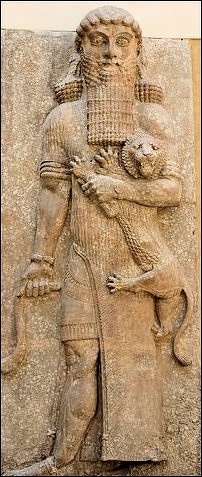
Maybe Enkidu, maybe Gilgamesh
Because Gilgamesh is too energetic for the people of Uruk, the gods decide to create a partner for him: In Tablet 1 of the Babylonian Gilgamesh, Gilgamesh’s mother, the goddess Aruru, creates such a companion: the wild man Enkidu, who runs with the animals on the steppe. Enkidu is first tamed and made human by a temple harlot. Then he is taken to Uruk, where he wrestles with Gilgamesh. The match is a draw and the two become inseparable companions.
Out I went, into the world, but there was none better, none whom he, Gilgamesh, could not best.
And so, with his arms, he returned to Uruk. But in their houses, the men of Uruk muttered:
'Gilgamesh, noisy Gilgamesh! Arrogant Gilgamesh!'
All young men gone - Defeated by Gilgamesh, and no son was left to his father.
All young girls made women by Gilgamesh
His lusts are such, and no virgin left to her lover!
Not the daughter of a warrior,
Nor the wife of a nobleman!
Yet he is king and should be
The people's careful shepherd.
He is king and should be
Shepherd of the city.
He is wise, he is handsome, he is firm as a rock.
In heaven the gods heard
Heard the lament of the people,
[Source: Robert Temple translation, verse version of the Epic of Gilgamesh by Robert Temple, Rider, an imprint of Random Century Group Ltda, 1991, Gates of Babylon]
“And the gods cried out to the Great God, higher king of Uruk:
'Strong as a wild bull is this Gilgamesh
So he was made by Aruru, the godess
None there is who can - not one
None who can survivea him in fighting.
No son left to his father.
Gilgamesh, he takes them all, and is he
He the king? Shepherd of the people?
No virgin left to her lover, For he lusts strongly!
No, nor the wife of the nobleman!
The Great God heard this, then
To the Goddess of Creation, Aruru -
Cried all the gods:
'You created this Gilgamesh! Well, create him his equal!
Let him look as into mirrors - Give a second self to him, yes;
Rushing winds meet rushing winds!
Let them flow heart to heart against -
Give them each other to fight,
Leaving Uruk in peace!'
“So the Goddess of Creation took and formed in her mind
This image, and there it was conceived -
in her mind, and it was made of material
That composes the Great God,
He of the Firmament.
She then plunged her hands down into water and pinched off a little clay. She let it drop in the wilderness
Thus the noble Enkidu was made. For this was he the very strength of Ninurta, the God of War, was his form, rough bodied, long hair,
Enkidu, the Wild Man
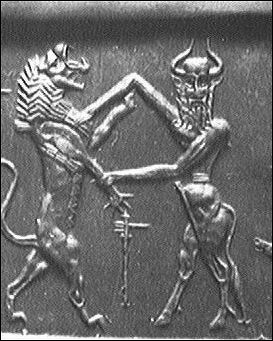
Enkidu and the Lion
Enkidu’s “hair waved like corn filaments -
Yes, like the hair of that goddess
Who is the corn, she , Nisaba. Matted hair was all over his body, like the skins of the cattle.
Yes, like the body of that god.
Who is the cattle, he, Samugan.
This Enkidu was innocent of mankind.
He knew not the cultivated land.
Enkidu ate grass in the hills with the gazelle
Jostled with wild beasts at the water-holes;
He had joy of the water with the herds of wild game.
[Source: S. Dalley, Myths from Mesopotamia (New York: Oxford University Press, 1991), pp. 52-56, 138-39, piney.com]
“But there was a trapper who met him one day
Face to face at the drinking-hole,
For the wild game had entered his territory.
On three days he met him face to face, and the trapper was frozen with fear.
He went back to his house with the game he had caught,
He was dumb, frozen with fear.
His face was changed like that of someone who has made a long journey.
With awe in his heart he spoke to his father:
"Father, there is a man, unlike any other, who comes down from the hills.
He is the strongest in the world, he is like an immortal from heaven.
He ranges over the hills with wild beasts and eats grass;
He ranges through your land and comes down to the wells.
I am afraid and dare not go near him.
He fills in the pits which I dig and tears up my traps set for the game;
He helps the beasts escape and now they slip through my fingers."
“The hunter made his voice heard and spoke, he said to his father,
"Father, there was a young man who came from the mountain,
On the land he was strong, he was powerful.
His strength was very hard, like a sky-bolt of Anu.
He walks on the mountain all the time,
All the time he eats vegetation with cattle,
All the time he puts his feet in the water at the watering place.
I am too frightened to approach him.
He kept filling in the pits that I dug,
He kept pulling out the traps that I laid.
He kept helping cattle, wild beasts of open country, to escape my grasp.
He will not allow me to work in open country."
Robert Graves and Raphael Pitai wrote in “Hebrew Myths”: “.Primeval man was held by the Babylonians to have been androgynous. Thus the Gilgamesh Epic gives Enkidu androgynous features: 'the hair of his head like a woman's, with locks that sprout like those of Nisaba, the Grain-goddess.' The Hebrew tradition evidently derives from the Greek sources, because both the terms in a Tannaitic midrash to describe the bisexual Adam are Greek: androgynos, 'man-woman', and diprosopon, 'two-faced'. Philo of Alexandria, the hellenistic philosopher and commentator on the Bible, contemporary with Jesus, held that man was at first bisexual; so did the Gnostics. This belief is clearly borrowed form Plato. Yet the belief of two bodies placed back to back may well have been founded on observaation of Siamese twins, which are sometimes joined in this awkward manner. The two-faced Adam appears to be a fancy derived from coins or statues of Janus, the Roman New Year god. [Source: Robert Graves and Raphael Pitai, “Hebrew Myths,” Greenwich House, 1983]
How to Bring Enkidu Under Control
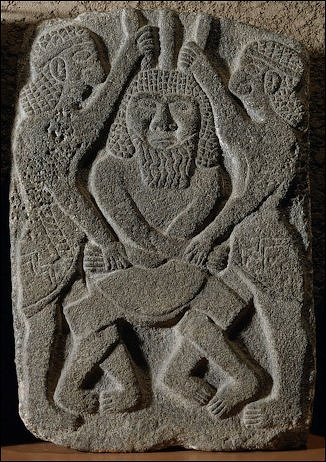
Syrian relief of two heros fighting, maybe Enkidu and Gilgamesh
The Epic of Gilgamesh continues: “His father spoke to him, to the hunter,
"... Uruk, Gilgamesh.
... his open country.
His strength is very hard, like a sky-bolt of Anu
Go, set your face towards Uruk.
... the strength of a man,
... lead her forth, and
... the strong man.
When he approaches the cattle at the watering place,
She must take off her clothes and reveal her attractions.
He will see her and go close to her.
Then his cattle, who have grown up in open country with him, will become
alien to him."
He listened to the advice of his father.
The hunter went off to see Gilgamesh.
He took the road, set his face towards Uruk,
Entered the presence of Gilgamesh, and said:
[Source: S. Dalley, Myths from Mesopotamia (New York: Oxford University Press, 1991), pp. 52-56, 138-39, piney.com]
“"There was a young man who came from the mountain,
On the land he was strong, he was powerful.
His strength is very hard, like a sky-bolt of Anu.
He walks on the mountain all the time,
All the time he eats vegetation with cattle,
All the time he puts his feet in the water at the watering place.
I am too frightened to approach him.
He kept filling in the pits that I dug,
He kept pulling out the traps that I laid.
He kept helping cattle, wild beasts of open country, to escape my grasp.
He will not allow me to work in open country."
“Gilgamesh spoke to him, to the hunter,
"Go, hunter, lead forth the harlot Shamhat,
And when he approaches the cattle at the watering place,
She must take off her clothes and reveal her attractions.
He will see her and go close to her.
Then his cattle, who have grown up in open country with him, will become
alien to him."
Endiku Makes Love to the Harlot Shamhat
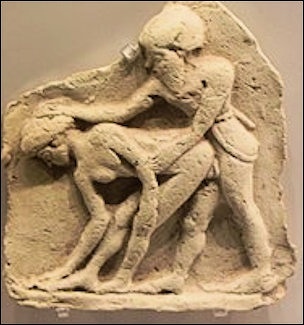
“The hunter went; he led forth the harlot Shamhat with him,
And they took the road, they made the journey.
In three days they reached the appointed place.
Hunter and harlot sat down in their hiding place.
For one day, then a second, they sat at the watering place.
Then cattle arrived at the watering place; they drank.
Then wild beasts arrived at the water; they satisfied their need.
[Source: S. Dalley, Myths from Mesopotamia (New York: Oxford University Press, 1991), pp. 52-56, 138-39, piney.com]
“And he, Enkidu, whose origin is the mountain,
Who eats vegetation with gazelles,
Drinks at the watering place with cattle,
Satisfied his need for water with wild beasts.
Shamhat looked at the primitive man,
The murderous youth from the depths of open country.
“"Here he is, Shamhat, bare your bosom,
Open your legs and let him take in your attractions!
Do not pull away, take wind of him!
He will see you and come close to you.
Spread open your garments, and let him lie upon you,
Do for him, the primitive man, as women do.
Then his cattle, who have grown up in open country with him,
will become alien to him.
His love-making he will lavish upon you!"
“Shamhat loosened her undergarments, opened her legs and he took in her attractions.
She did not pull away. She took wind of him,
Spread open her garments, and he lay upon her.
She did for him, the primitive man, as women do.
His love-making he lavished upon her.
For six days and seven nights Enkidu was aroused and poured himself into Shamhat.
Enkidu Becomes Civilized
“When he was sated with her charms,
He set his face towards the open country of his cattle.
The gazelles saw Enkidu and scattered,
The cattle of open country kept away from his body.
For Enkidu had stripped; his body was too clean.
His legs, which used to keep pace with his cattle, were at a standstill.
Enkidu had been diminished, he could not run as before.
Yet he had acquired judgment, had become wiser.
He turned back, he sat at the harlot's feet.
The harlot was looking at his expression,
And he listened attentively to what the harlot said.
The harlot spoke to him, to Enkidu,
[Source: S. Dalley, Myths from Mesopotamia (New York: Oxford University Press, 1991), pp. 52-56, 138-39, piney.com]
"You have become wise Enkidu, you have become like a god.
Why should you roam open country with wild beasts?
Come, let me take you into Uruk the Sheepfold,
To the pure house, the dwelling of Anu and Ishtar,
Where Gilgamesh is perfect in strength,
And is like a wild bull, more powerful than any of the people."
She spoke to him, and her speech was acceptable.
(The earlier Old Babylonian version continues the narrative.)
“The woman's suggestions
Penetrated his heart.
She took off her garments,
Clothed him in one,
Dressed herself
In a second garment,
Took his hand,
Like a goddess led him
To a shepherd's hut
Where there was a sheep-pen.
The shepherds gathered over him
. . . . . . .
He used to suck the milk
Of wild animals.
They put food in front of him.
He narrowed his eyes, and looked,
Then stared.
Enkidu knew nothing
Of eating bread,
Of drinking beer.
He had never learned.
The harlot made her voice heard
And spoke to Enkidu,
"Eat the food, Enkidu,
The symbol of life.
Drink the beer, destiny of the land."
Enkidu ate the bread
Until he had had enough.
He drank the beer,
Seven whole jars,
Relaxed, felt joyful.
His heart rejoiced,
His face beamed,
He smeared himself with ...
His body was hairy.
He anointed himself with oil
And became like any man,
Put on clothes.
He was like a warrior,
Took his weapon,
Fought with lions.
The shepherds could rest at night;
He beat off wolves,
Drove off lions.
The older herdsmen lay down;
Enkidu was their guard,
A man wake.
Gilgamesh Seeks the Humbaba
Mircea Eliade of the University of Chicago wrote: “One day, Gilgamesh, always looking for adventure, proposes that he and Enkidu travel to the distant cedar forest to kill Humbaba, its evil guardian. Enkidu protests that the journey is very dangerous and Humbaba very fierce, but Gilgamesh is determined and finally they set out. The undertaking is successful and the two are covered with glory. But Enkidu has already had premonitions of disaster. On their return to Uruk, the goddess Ishtar sees the beauty of Gilgamesh and proposes to him. He rejects her, reminding her of the fates of her previous lovers. She is furious and has Anu send the sacred bull of heaven to attack him. When Gilgamesh and Enkidu slay the bull, the gods become very angry-this is too presumptuous.
Gilgamesh and Humbaba, version A: “1-7 Now the lord once decided to set off for the mountain where the man lives; lord Gilgamesh decided to set off for the mountain where the man lives. He spoke to his slave Enkidu: "Enkidu, since a man cannot pass beyond the final end of life, I want to set off into the mountains, to establish my renown there. Where renown can be established there, I will establish my renown; and where no renown can be established there, I shall establish the renown of the gods." [The Humbaba is known as as Huwawa; The name may mean 'the wicked one'] [Source: J.A. Black, G. Cunningham, E. Robson, and G. Zlyomi 1998, 1999, 2000, Electronic Text Corpus of Sumerian Literature, Oxford University, piney.com]
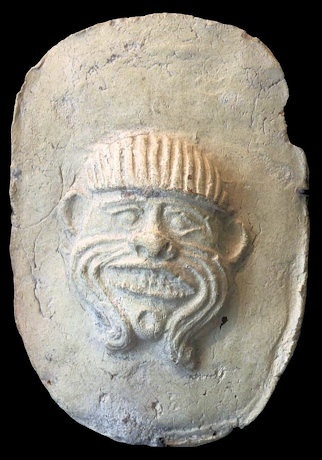
head of Humbaba (Huwawa)
“8-20 His slave Enkidu answered him: "My lord, if today you want to set off into the mountains, Utu should know about it from us. Utu, youthful Utu, should know about it from us. A decision that concerns the mountains is Utu's business. A decision that concerns the Mountains of Cedar-felling is the business of youthful Utu. Utu should know about it from us." Gilgamesh prepared a white kid.He clasped a brown kid, a sacrificial animal, close to his breast. In his hand he held a holy staff before his nose, as he addressed Utu of heaven: "Utu, I want to set off into the mountains! May you be my helper! I want to set off into the Mountains of Cedar-felling! May you be my helper!" From heaven Utu replied to him: "Young man, you are noble already in your own right — but what would you want with the mountains?"
“21-33 "Utu, I have something to say to you — a word in your ear! I greet you — please pay attention! In my city people are dying, and hearts are full of distress. People are lost — that fills me with dismay. I craned my neck over the city wall: corpses in the water make the river almost overflow. That is what I see. That will happen to me too — that is the way things go. No one is tall enough to reach heaven; no one can reach wide enough to stretch over the mountains. Since a man cannot pass beyond the final end of life, I want to set off into the mountains, to establish my renown there. Where renown can be established there, I will establish my renown; and where no renown can be established there, I shall establish the renown of the gods."
“34-47 Utu accepted his tears as a fitting gift. As befits a compassionate person, he turned to him full of compassion: "Now there are seven warriors, sons of a single mother. The first, their eldest brother, has lion's paws and eagle's talons. The second is a ...... snake, ....... The third is a dragon snake, ....... The fourth blazes with fire ....... The fifth is a ...... snake, ....... The sixth beats at the flanks of the mountainslike a battering flood The seventh ...... flashes like lightning, and no one can deflect it... They should guide you through the mountain valleys!The warrior, youthful Utu, gave these seven to Gilgamesh. The feller of cedars was filled with joy; lord Gilgamesh was filled with joy.
“48-60 In his city he had the horn sounded for single men; similarly for two together he made them call out. "Let him who has a household go to his household! Let him who has a mother go to his mother! Let bachelor males, types like me, join me at my side!" Whoever had a household went to his household. Whoever had a mother went to his mother. Bachelor males, types like him — there were fifty — joined him at his side. He made his way to the blacksmith's, and had them cast ...... weapons and axes, the strength of warriors. Then he made his way to the deeply shaded plantations, where he had ebony trees felled, and halub trees, apricot trees, and box trees. He ...... to his fellow-citizens who were going with him. The first, their eldest brother, has lion's paws and eagle's claws. They will guide him through the mountain valleys.
“61-75 He crossed the first mountain range,but his intuition did not lead him to find the cedars there. When he had crossed the seventh mountain range, there his intuition led him to find the cedars. He did not need to ask, nor did he have to search any further. Lord Gilgamesh began to chop at the cedars, while Enkidu lopped off their branches, ...... to Gilgamesh. ...... stacked them in piles. He loosed his terrors against .......Gilgamesh ...... was overcome by sleep, and it affected Enkidu ...... as a powerful longing. His fellow-citizens who had come with him flailed around at his feet like puppies. Enkidu awoke from his dream, shuddering from his sleep. He rubbed his eyes; there was eery silence everywhere. He touched Gilgamesh, but could not rouse him. He spoke to him, but he did not reply.
“76-89 "You who have gone to sleep, you who have gone to sleep! Gilgamesh, young lord of Kulaba, how long will you sleep for? The mountains are becoming indistinct as the shadows fall across them; the evening twilight lies over them. Proud Utu is already on his way to the bosom of his mother Ningal. Gilgamesh, how long will you sleep for? The sons of your city who came with you should not have to wait at the foot of the hills. Their own mothers should not have to twine string in the square of your city.” He thrust that into his right ear; he covered him with his aggressive words as if with a cloth in his hand a cloth with thirty shekels of oil on it and smothered it over Gilgamesh's chest. Then Gilgamesh stood up like a bull on the great earth. Bending his neck downwards, he yelled at him:
“90-106 "By the life of my own mother Ninsun and of my father, holy Lugalbanda! Am I to become again as if I were slumbering still on the lap of my own mother Ninsun?" A second time he spoke to him: "By the life of my own mother Ninsun and of my father, holy Lugalbanda! Until I discover whether that person was a human or a god, I shall not direct back to the city my steps which I have directed to the mountains." The slave, trying to ameliorate the situation, trying to make life appear more attractive, answered his master: "My master, you have not yet really seen that person, he should not vex you. — But he vexes me — me, who have seen him before. His pugnacious mouth is a dragon's maw; his face is a lion's grimace. His chest is like a raging flood; no onedare approach his brow, which devours the reed-beds. Travel on, my master, up into the mountains! — but I shall travel back to the city. If I say to your mother about you "He is alive!", she will laugh. But afterwards I shall say to her about you "He is dead!", and she will certainly weepover you."
“107-120 "Look, Enkidu, two people together will not perish! A grappling-pole does not sink! No one can cut through a three-ply cloth! Water cannot wash someone away from a wall! Fire in a reed house cannot be extinguished! You help me, and I will help you — what can anyone do against us then? When it sank, when it sank, when the Magan boat sank, when the magilum barge sank, then at least the life-saving grappling-pole of the boatwas rescued! Come on, let's get after him and get a sight of him! "If we go after him, there will be terror! There will be terror. Turn back! Is it advisable? Is it advisable? Turn back!""Whatever you may think — come on, let's get after him!”
Gilgamesh and Enkidu Defeats the Humbaba
Joan Acocella wrote in The New Yorker: ““Humbaba is no ordinary monster. He is like a miasma, or a nightmare. He has seven auras in which he can wrap himself, and which he can send out, as a means of defense. As Gilgamesh and Enkidu approach, he taunts them. “Spawn of a fish,” he calls the fatherless Enkidu. He tells Gilgamesh that forest birds will soon be feasting on his body parts. Though shaking with fear, the two men seize him. Gilgamesh plunges a dirk into his neck. Enkidu rips out his lungs. The auras run away. Then the men cut down several giant cedars, build a raft, and, with Gilgamesh brandishing the head of Humbaba, sail back to Uruk. [Source: Joan Acocella, The New Yorker, October 7, 2019]
“121-135 Before a man can approach within even sixty times six yards, Humbaba has already reached his house among the cedars. When he looks at someone, it is the look of death. When he shakes his head at someone, it is a gesture full of reproach. "You may still be a young man, but you will never again return to the city of your mother who bore you!" Fear and terror spread through his sinews and his feet. He could not move his feet on the ground; the big toenails of his feet stuck ...... to the path . At his side .......(Humbaba addressed Gilgamesh:) "So come on now, you heroic bearer of a sceptre of wide-ranging power! Noble glory of the gods, angry bull standing ready for a fight! Your mother knew well how to bear sons, and your nurse knew well how to nourish children on the breast! Don't be afraid, rest your hand on the ground! [Source: J.A. Black, G. Cunningham, E. Robson, and G. Zlyomi 1998, 1999, 2000, Electronic Text Corpus of Sumerian Literature, Oxford University, piney.com]
“136-148 Gilgamesh rested his hand on the ground, and addressed Humbaba: "By the life of my own mother Ninsun and of my father, holy Lugalbanda! No one really knows where in the mountains you live; they would like to know where in the mountains you live. Here, I have brought you En-me-barage-si, my big sister, to be your wife in the mountains." And again he addressed him: "By the life of my mother Ninsun and of my father, holy Lugalbanda! No one really knows where in the mountains you live; they would like to know where in the mountains you live. Here, I have brought you Ma-tur, my little sister, to be your concubine in the mountains. Just hand over your terrors to me! I want to become your kinsman!" Then Humbaba handed over to him his first terror. Gilgamesh's fellow-citizens who had come with him began to lop off the branches and bundle them together, so as to lay them down at the foot of the hills.
“148A-148K And again he addressed him: "By the life of my mother Ninsun and of my father, holy Lugalbanda! No one really knows where in the mountains you live; they would like to know where in the mountains you live. Here, I have brought to the mountains for you ....... Couldn't I get close to you and your family? Just hand over your terrors to me! I want to become your kinsman! "Then Humbaba handed over to him his second terror. Gilgamesh's fellow-citizens who had come with him began to lop off the branches and bundle them together, so as to lay them down at the foot of the hills.
“148L-148V And a third time he addressed him: "By the life of my mother Ninsun and of my father, holy Lugalbanda! No one really knows where in the mountains you live; they would like to know where in the mountains you live. Here, I have brought to the mountains for you some eca flour — the food of the gods! — and a waterskin of cool water. Couldn't I get close to you and your family? Just hand over your terrors to me! I want to become your kinsman! "Then Humbaba handed over to him his third terror. Gilgamesh's fellow-citizens who had come with him began to lop off the branches and bundle them together, so as to lay them down at the foot of the hills.
“148W-148FF And a fourth time he addressed him: "By the life of my mother Ninsun and of my father, holy Lugalbanda! No one really knows where in the mountains you live; they would like to know where in the mountains you live. Here, I have brought to the mountains for you some big shoes for big feet. Couldn't I get close to you and your family? Just hand over your terrors to me! I want to become your kinsman! " Then Humbaba handed over to him his fourth terror. Gilgamesh's fellow-citizens who had come with him began to lop off the branches and bundle them together, so as to lay them down at the foot of the hills.
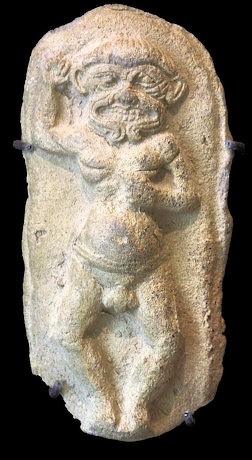
Humbaba
“148GG-148PP And a fifth time he addressed him: "By the life of my mother Ninsun and of my father, holy Lugalbanda! No one really knows where in the mountains you live; they would like to know where in the mountains you live. Here, I have brought to the mountains for you some tiny shoes for your tiny feet. Couldn't I get close to you and your family? Just hand over your terrors to me! I want to become your kinsman! " Then Huawa handed over to him his fifth terror. Gilgamesh's fellow-citizens who had come with him began to lop off the branches and bundle them together, so as to lay them down at the foot of the hills.
“148QQ-148AAA And a sixth time he addressed him: "By the life of my mother Ninsun and of my father, holy Lugalbanda! No one really knows where in the mountains you live; they would like to know where in the mountains you live. Here, I have brought you rock-crystal, nir stone and lapis lazuli — from the mountains. Couldn't I get close to you and your family? Just hand over your terrors to me! I want to become your kinsman! " Then Humbaba handed over to him his sixth terror. Gilgamesh's fellow-citizens who had come with him began to lop off the branches and bundle them together, so as to lay them down at the foot of the hills.)
“149-162 When Humbaba had finally handed over to him his seventh terror, Gilgamesh found himself beside Humbaba. Hewent up to him gradually from behind, as one does with a ...... snake. He made as if to kiss him, but then punched him on the cheek with his fist. Humbaba bared his teeth at him. He threw a halter over him as over a captured wild bull. He tied up his arms like a captured man. He tugged at Gilgamesh's hand. "I want to talk to Utu! ""Utu, I never knew a mother who bore me, nor a father who brought me up! I was born in the mountains — you brought me up! Yet Gilgamesh swore to me by heaven, by earth, and by the mountains." Humbaba clutched at Gilgamesh's hand, and prostrated himself before him. Then Gilgamesh's noble heart took pity on him. Gilgamesh addressed Enkidu: "Enkidu, let the captured bird run away home! Let the captured man return to his mother's embrace!
“163-174 Enkidu replied to Gilgamesh "Come on now, you heroic bearer of a sceptre of wide-ranging power! Noble glory of the gods, angry bull standing ready for a fight! Young lord Gilgamesh, cherished in Unug, your mother knew well how to bear sons, and your nurse knew well how to nourish children! — One so exalted and yet so lacking in understanding will be devoured by fate without him ever understanding that fate. The very idea that a captured bird should run away home, or a captured man should return to his mother's embrace! — Then you yourself would never get back to the mother-city that bore you!
“175-192 Humbaba addressed Enkidu: "Enkidu, you speak such hatefulyou speak such hateful words to him." As Humbaba spoke thus to him, Enkidu, full of rage and anger, cut his throat..He put He chucked his head in a leather bag. They entered before Enlil. After they had kissed the ground before Enlil, they threw the leather bag down, tipped out his head, and placed it before Enlil. When Enlil saw the head of Humbaba, he spoke angrily to Gilgamesh: "Why did you act in this way?...... did you act ......? He should have eaten the bread that you eat, and should have drunk the water that you drink!He should have been honoured ...... you!
“193-202 He gave Humbaba's first aura to the fields.
He gave his second aura to the rivers.
He gave his third aura to the reed-beds.
He gave his fourth aura to the lions.
He gave his fifth aura to the palace.
He gave his sixth aura to the forests.
He gave his seventh aura to Nungal (the goddess of prisoners) .
.... his terror ......
Mighty one, Gilgamesh,who is cherished!”
Ishtar, Gilgamesh and the Bull of Heaven
Joan Acocella wrote in The New Yorker: ““Once home, Gilgamesh bathes, puts on clean clothes, and shakes out his long hair. Seeing him, Ishtar, the goddess of love and war, is dazzled, and calls out to him, proposing marriage: “Grant me your fruits, O grant me!” She will give him a chariot of lapis lazuli and gold, she says. His ewes will bear twins; his goats will bear triplets. Gilgamesh responds by inquiring how he would profit from marrying her. You are a brazier that goes out in the cold, he tells her. You are a door that lets in the wind, a palace that collapses on top of its warriors, a water skin that leaks, a shoe that pinches the foot. The men that you loved: what became of them? One you turned into a frog, another into a wolf. No thanks, he says. [Source: Joan Acocella, The New Yorker, October 7, 2019]
“Ishtar, greatly insulted, runs up to Heaven, to her father, Anu, and asks to be given the Bull of Heaven, to avenge these insults. Descending to Uruk with the goddess, the formidable beast does serious harm even as it lands. One snort, and the earth opens up; a hundred men fall into it. A second snort, and another pit opens; two hundred men are swallowed up. On the third snort, when the cleft opens, Enkidu falls into it, but only up to his waist (because he is a giant), and he grasps the bull by the horns. It slobbers on Enkidu’s face. It defecates on him. But Gilgamesh stabs it in the neck, and it dies. When Ishtar protests, Enkidu tears off one of the bull’s haunches and throws it at her, saying that he would happily have ripped off her limbs and thrown them at the bull. He and Gilgamesh then wash their hands in the Euphrates and, clasping each other, return in triumph to the palace. “Who is the finest among men?” Gilgamesh asks his serving maids. “Who the most glorious of fellows?”
“The triumph is short-lived. That very night, Enkidu has a dream that, to atone for the crime of murdering the Bull of Heaven, one of the two men must die. No one needs to ask which. Enkidu sickens. He starts to complain. Why could he not have died in combat? That way, people would remember him. But then the tablets break off. As Michael Schmidt writes, Enkidu has “some thirty so far silent lines to bid his beloved Gilgamesh good-bye and perish.”
Ishtar Wants Gilgamesh for a Lover, Gilgamesh Refuses
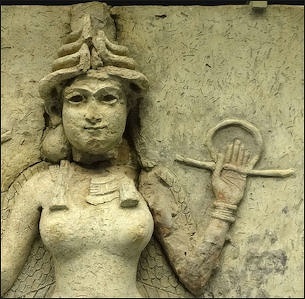
Ishtar
Tablet VI, col. 1 of the “Epic of Gilgamesh” reads: "To Gilgamesh's beauty Great ISHTAR [Astarte-Aphrodite] lifted her eyes. 'Come, Gilgamesh, be my lover! Give me the taste of your body. Would that you were my husband, and I were your wife! I'd order harnessed for you a chariot of lapis lazuli and gold, its wheels of gold and its horns of precious amber. You will drive storm demons — powerful mules! Enter our House, into the sweet scent of cedarwood. As you enter our House, the Purification Priests will kiss your feet the way they do in Aratta. Kings, rulers, princes will bend down before you. Mountains and lands will bring their yield to you. Your goats will drop triplets, your ewes twins. Even loaded down, your donkey will overtake the mule. Your horses will win fame for their running. Your ox under its yoke will have no rival!' [Source: CSUN, Powell, Classical Myth, pp. 62; 247-249; 334-336]
“Gilgamesh shaped his mouth to speak, saying to Great Ishtar: 'What could I give you if I should take you as a wife? Would I give you oil for the body, and fine wrappings? Would I give you bread and food? You who eat the food of the gods, you who drink the wine fit for royalty! For you they pour out libations. You are clothed with the Great Garment! Ah, the gap between us, if I take you in marriage.
“'You are a cooking fire that goes out in the cold; a back door that keeps out neither wind nor storm; a palace that crushes the brave ones defending it; a well whose lid collapses; pitch that dirties one who is carrying it; a waterskin that soaks the one who lifts it; limestone that crumbles in the stone wall; a battering-ram that shatters in the land of the enemy; a shoe that pinches the owner's foot!
'Which of your lovers have you loved forever? Which of your Little Shepherds has continued to please you? Come, let me name your lovers for you! ... (col. 2:) ... for Tammuz, the lover of your youth. Year after year you set up a wailing for him. You loved the mauve-colored 'shepherd bird': but you seized him and broke his wing .... So you would love me in my turn, and, as with them, set my fate...."
Gilgamesh and the Bull of Heaven
In The Epic of Gilgamesh, Inanna (Ishtar) is the prototypical usurping woman who demands to have all religious and secular authority. She usually seduces or gets the authorities drunk or just creates a great fury. In this episode, furious that Gilgamesh rejected her, she goes to An, the god of heaven, and demands the bull of heaven do battle against Gilgamesh.
“I will sing the song of the man of battle, the man of battle. I will sing the song of lord Gilgamesh, the man of battle, I will sing the song of him with the well-proportioned limbs, the man of battle. I will sing the song of the mighty ...... lord, the man of battle. I will sing the song of the lord with the very black beard, the man of battle. I will sing the song of ...... athletic strength, the man of battle. ...... the king, the man ......; my king ......, my lord ...... garden ....... ...... courtyard, ...... jipar;[Source: J.A. Black, G. Cunningham, E. Robson, and G. Zlyomi 1998, 1999, 2000, Electronic Text Corpus of Sumerian Literature, Oxford University, piney.com]
In the great courtyard, without there being any combat, a man ....... She perceived the canopy, the canopy ......, holy Ishtar perceived the canopy, from the palace of the abzu, she perceived the canopy ......:"My wild bull, my ...... man, I shall not let you go! Lord Gilgamesh, my wild bull, my ...... man, I shall not let you go! I shall not let you go to dispense justice in the E-ana! I shall not let you go to pronounce verdicts in my holy jipar! I shall not let you go to dispense justice in the E-ana beloved by An! Gilgamesh, may you be ......, may you be ......!"
(Gilgamesh speaks:) "I shall certainly not try to take over the portion of Ishtar in your jipar. Ninegal will not ...... because of my valorous strength. But Ishtar, lady, don't you block my way, either! My wish is to catch mountain bulls, to fill the cow-pens. I wish to catch mountain sheep, to fill the sheepfolds. I wish to ...... silver and cornelian." The queen spoke with a snort; Ishtar spoke with a snort: "...... say to you. ...... say to you. ......, Gilgamesh." [7 lines damaged] (An speaks:) "Its entrails ....... Its hide ....... Its blood ......." "Ishtar, it will muddy the waters; it will ...... cowpats. My one beloved by An, ......." He let her hold the leash. An ....... "My child, who does it belong to?" "It will stir up the waters, it will leave ...... cowpats ......! If the great bull is let loose, ...... Unug! If the great bull is let loose against Gilgamesh, ...... Unug! I will not give her that which bears my own name."
Havoc Caused by Ishtar and the Bull of Heaven
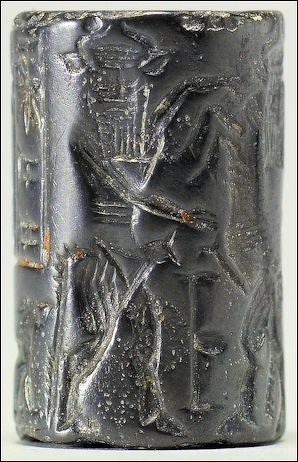
Enkidu and the Bull of Heaven
Everyone is afraid of Ishtar’s violent disposition so she gets the bull. Unfortunately, he is a real "bull in the china shop" and consumes all of the water and food.
(Ishtar speaks:) "Maybe it will muddy the waters, and will leave gigantic cowpats — but let my father give me the Bull of Heaven, so I can kill the lord, so I can kill the lord, so I can kill the lord, lord Gilgamesh!" Great An replied to holy Ishtar: "My child, the Bull of Heaven would not have any pasture, as its pasture is on the horizon. Maiden Ishtar, the Bull of Heaven can only graze where the sun rises. So I cannot give the Bull of Heaven to you!"
Holy Ishtar replied to him: "I shall shout, and make my voice reach heaven and earth!" He was frightened, he was frightened. Great An replied to holy Ishtar: "I shall give her the Bull of Heaven." In masculine fashion, the maiden Ishtar grasped it by the lapis-lazuli tether. Holy Ishtar brought the Bull of Heaven out. At Unug, the Bull devoured the pasture, and drank the water of the river in great slurps. With each slurp it used up one mile of the river, but its thirst was not satisfied. It devoured the pasture and stripped the land bare. It broke up the palm trees of Unug, as it bent them to fit them into its mouth. When it was standing, the Bull submerged Unug. The very presence of the Bull of Heaven submerged Kulaba....
Lord Gilgamesh ....... Ishtar ...... the Bull of Heaven. At Unug, the Bull ......, and drank the water of the river in great slurps. With each slurp it used up one mile of the river, but its thirst was not satisfied. It devoured the pasture and stripped the land bare..."They will throw your corpse in the deserted streets, and throw your intestines in the broad square. They will send your carcass to the knacker's, and I shall share out your meat in baskets to the widows' sons who are citizens of my city ....... I shall make flasks of your two horns for pouring fine oil to Ishtar in E-ana."
Ishtar watched from the top of the ramparts. The Bull Lugal-gabajal in the dust, and Gilgamesh walked at its head as Enkidu climbed up the rope of its ....... Their fellow-citizens came along ....... It covered them with dust, like a young calf unused to the yoke. Enkidu stood behind the Bull and went round ..... He spoke to his master Gilgamesh: "Ho! magnificent one, extending your staff of office, born of noble lineage, splendour of the gods, furious bull standing ready for battle, who is respected as the great lord Gilgamesh of Unug! Your mother was truly skilled in bearing children, and your nurse was truly skilled in suckling her charges! Do not fear — the warrior without strength ...... himself . There where the road is straight ....... ...... axe ....... "
Gilgamesh Destroys the Bull of Heaven
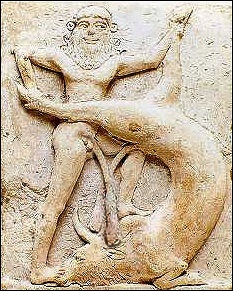
A version from Me-Turan: “I will sing the song of the man of battle, the man of battle. I will sing the song of lord Gilgamesh, the man of battle, I will sing the song of the lord with the very black beard, the man of battle. I will sing the song of him with the well-proportioned limbs, the man of battle. I will sing the song of him in his prime , the man of battle. I will sing the song of him who batters the wicked, the man of battle. The king, the lord, having ...... as his mother who bore him ......, wishing to wash in the river.
My lord, entering the garden planted with junipers, as you set to work; the lord, coming from the jipar, sheared the wool of the fleecy sheep ......; ...... he sat down ....... The king ...... bending ...... with the oar; the prince covered ...... with the oar, as if it was of flourishing reed. You covered their wicked ones, as if ......, with water. He gave ...... to his mother who bore him. In the wide courtyard ..... Then ...... the canopy ....... Holy Ishtar perceived the canopy, from the palace of the abzu, she perceived the canopy: "My wild bull, my man, I shall not let you ......! Gilgamesh, I shall not let you ......! I shall not let you dispense justice in my E-ana! I shall not let you pronounce verdicts in my holy jipar! I shall not let you dispense justice in the E-ana beloved by An! Gilgamesh, may you ......, may I ......."
The king ...... these words, the king ...... to his mother who bore him. Gilgamesh ...... to Ninsun ......: "O mother who bore me, how ......! By the door of the great gate ...... From the crenellations of the wall ......: "My wild bull, my man, I shall not let you go ......! Gilgamesh, I shall not let you go ......! You dispensed justice in my E-ana — I shall not let you go! You pronounced verdicts in my holy jipar — I shall not let you go, in his beloved ...... E-ana!"
"My musician, Lugal-gabajar, perform your song, tune your strings! Give me beer to drink! Fill my bronze jug again! ......"Lugal-gabajar replied to his master, Gilgamesh: "My master, you may eat, and you may drink — but as for me, how does this matter concern me?" To defeat the Bull, ......, Gilgamesh, to defeat the Bull, ....... ...... his harness of fifty (text: five-sixths) minas. ...... his sword weighing seven talents and thirty minas. ...... his battle axe. "My mother who bore me ......." His sister ....... His mother who bore him ...... Pectur, his little sister ....... Gilgamesh ...... "My mother who bore me, in the house of Enki ....... Pectur, the little sister, ......, will bring back the cattle to their tethering stakes ......, will bring back the sheep to their tethering stakes ......."
"Bull of Heaven, you — you, ......, yes, you! You crush them ......, and I crush them ....... If you crush them, ...... They shall consign your hide to the streets ....... They shall consign your intestines to the broad square ....... The widows' sons of my city shall each take their share of your meat in baskets. They shall consign your carcass to the knacker's, and I shall turn your two horns into flasks for pouring fine oil to Ishtar in E-ana."
The Bull ...... in the dust. Gilgamesh ...... and Enkidu ....... Their fellow-citizens ....... ...... with dust, like a young calf unused to the yoke. Enkidu stood by the Bull's head and spoke to Gilgamesh: "Ho! magnificent one, extending your staff of office, born of noble lineage, splendour of the gods, furious-hearted bull, standing ready for battle, warrior, ...... your hand ....... The people ......, the people ......."
When Enkidu had spoken thus to Gilgamesh, Gilgamesh himself smote its skull with his axe weighing seven talents. The Bull reared up so high, so high that it overbalanced. It spattered like rain, it spread itself out like the harvested crop. The king took his knife in his hand, just as if he were a master chef. He hit Ishtar with a haunch, he made her flee away like a pigeon, and demolished those ramparts. Standing by the Bull's head, the king wept bitter tears: "Just as I can destroy you, so shall I do the same to her ."
As he spoke, he consigned its hide to the streets, he consigned its intestines to the broad square, and the widows' sons of his city each took their share of its meat in baskets. He consigned its carcass to the knacker's, and turned its two horns into flasks for pouring fine oil to Ishtar in E-ana. For the death of the Bull of Heaven: holy Ishtar, it is sweet to praise you!
Image Sources: Wikimedia Commons
Text Sources: Internet Ancient History Sourcebook: Mesopotamia sourcebooks.fordham.edu , National Geographic, Smithsonian magazine, especially Merle Severy, National Geographic, May 1991 and Marion Steinmann, Smithsonian, December 1988, New York Times, Washington Post, Los Angeles Times, Discover magazine, Times of London, Natural History magazine, Archaeology magazine, The New Yorker, BBC, Encyclopædia Britannica, Metropolitan Museum of Art, Time, Newsweek, Wikipedia, Reuters, Associated Press, The Guardian, AFP, Lonely Planet Guides, “World Religions” edited by Geoffrey Parrinder (Facts on File Publications, New York); “History of Warfare” by John Keegan (Vintage Books); “History of Art” by H.W. Janson Prentice Hall, Englewood Cliffs, N.J.), Compton’s Encyclopedia and various books and other publications.
Last updated July 2024
